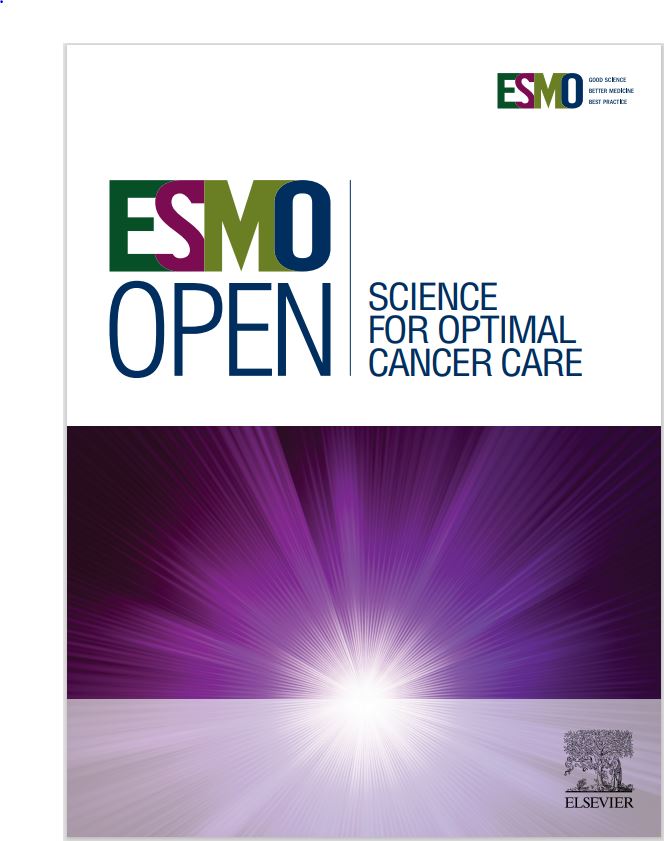Prognosis, clinicopathological characteristics, and treatment patterns of patients with ER-intermediate-positive breast cancer undergoing long-term follow-up
IF 7.1
2区 医学
Q1 ONCOLOGY
引用次数: 0
Abstract
Background
Estrogen receptor (ER) expression levels in breast cancer tissue predict the efficacy of endocrine therapy and the prognosis of breast cancer patients. Recently, it was reported that the prognosis of patients with ER-low-positive breast cancer was similar to that of ER-negative patients. This study aimed to investigate how ER expression levels impact the prognosis of patients with human epidermal growth factor receptor 2 (HER2)-negative early breast cancer undergoing long-term follow-up.
Patients and methods
The correlation between ER expression levels and prognosis was retrospectively evaluated in a cohort of 3091 consecutive patients with HER2-negative early breast cancer who were treated at our institute between 1981 and 2022. The median follow-up period was 85.2 (range 0-480) months. The proportion of ER-expressing cells in breast cancer tissues was assessed by immunohistochemistry and used to classify patients into four categories: ER negative (<1%), ER-low positive (1% ≤ ER < 10%), ER-intermediate positive (10% ≤ ER < 2/3), and ER-high positive (≥2/3).
Results
Patients with ER-intermediate-positive breast cancer had a prognosis similar to that of patients with ER-low-positive or ER-negative disease. By contrast, patients with ER-high-positive breast cancer had significantly longer disease-free survival (DFS) and overall survival (OS) times than the other groups. Multivariate analysis demonstrated that ER-intermediate positivity was an independent factor for poor prognosis for both DFS and OS in patients with HER2-negative early breast cancer. The distributions of tumor grades 1, 2, and 3 were nearly equal among the ER-intermediate-positive patients, whereas more than half of patients with ER-high-positive breast cancer had grade 1 tumors. By analyzing changes in prognosis over time, we found that the prognosis of patients with ER-high-positive breast cancer markedly improved over three decades, while that of patients with ER-intermediate-positive disease did not.
Conclusions
Patients with ER-intermediate-positive breast cancer differ from patients with ER-high-positive breast cancer, suggesting that the treatment of ER-positive breast cancer patients should be tailored based on ER expression levels.
er中阳性乳腺癌患者长期随访的预后、临床病理特点及治疗模式
背景乳腺癌组织中雌激素受体(ER)的表达水平可以预测内分泌治疗的效果和乳腺癌患者的预后。最近有报道称,er低阳性乳腺癌患者的预后与er阴性患者相似。本研究旨在探讨ER表达水平对人表皮生长因子受体2 (HER2)阴性早期乳腺癌患者长期随访预后的影响。患者和方法回顾性评估了1981年至2022年间在我院连续治疗的3091例her2阴性早期乳腺癌患者的ER表达水平与预后的相关性。中位随访时间为85.2个月(0-480个月)。通过免疫组织化学方法评估乳腺癌组织中ER表达细胞的比例,并将患者分为4类:ER阴性(<1%)、ER低阳性(1%≤ER <;10%), ER-中间阳性(10%≤ER <;2/3), er高阳性(≥2/3)。结果er中阳性乳腺癌患者的预后与er低阳性或er阴性乳腺癌患者相似。相比之下,er高阳性乳腺癌患者的无病生存期(DFS)和总生存期(OS)时间明显长于其他组。多因素分析表明,er中间产物阳性是her2阴性早期乳腺癌患者DFS和OS预后不良的独立因素。在er中阳性患者中,1级、2级和3级肿瘤的分布几乎相等,而超过一半的er高阳性乳腺癌患者为1级肿瘤。通过分析预后随时间的变化,我们发现雌激素受体高阳性乳腺癌患者的预后在30年内有明显改善,而雌激素受体中阳性患者的预后没有明显改善。结论ER中阳性乳腺癌患者与ER高阳性乳腺癌患者存在差异,应根据ER表达水平对ER阳性乳腺癌患者进行针对性治疗。
本文章由计算机程序翻译,如有差异,请以英文原文为准。
求助全文
约1分钟内获得全文
求助全文
来源期刊

ESMO Open
Medicine-Oncology
CiteScore
11.70
自引率
2.70%
发文量
255
审稿时长
10 weeks
期刊介绍:
ESMO Open is the online-only, open access journal of the European Society for Medical Oncology (ESMO). It is a peer-reviewed publication dedicated to sharing high-quality medical research and educational materials from various fields of oncology. The journal specifically focuses on showcasing innovative clinical and translational cancer research.
ESMO Open aims to publish a wide range of research articles covering all aspects of oncology, including experimental studies, translational research, diagnostic advancements, and therapeutic approaches. The content of the journal includes original research articles, insightful reviews, thought-provoking editorials, and correspondence. Moreover, the journal warmly welcomes the submission of phase I trials and meta-analyses. It also showcases reviews from significant ESMO conferences and meetings, as well as publishes important position statements on behalf of ESMO.
Overall, ESMO Open offers a platform for scientists, clinicians, and researchers in the field of oncology to share their valuable insights and contribute to advancing the understanding and treatment of cancer. The journal serves as a source of up-to-date information and fosters collaboration within the oncology community.
 求助内容:
求助内容: 应助结果提醒方式:
应助结果提醒方式:


